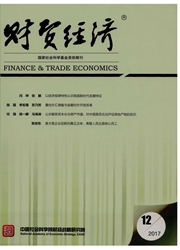

 中文摘要:
中文摘要:
本文以2010--2014年中国上市公司的数据为样本,运用PSM和DID方法分别考察了“营改增”先行地区(上海和8省市)及全国性“营改增”对公司流转税税负的影响。研究发现,与非试点地区试点行业相比,“营改增”对先行试点地区试点公司流转税税负无显著影响;与非试点公司相比,“营改增”使试点公司的流转税税负短期略有上升、长期略有下降。进一步区分所有权性质的检验发现,“营改增”使得国有企业和中央国有企业的流转税税负略有下降,非国有企业和地方国有企业的流转税税负在先行试点地区略有上升,但在全国性试点后短期略有上升、长期略有下降;“营改增”对非国有企业和地方国有企业的影响更大。整体而言,“营改增”对公司流转税税负并无显著影响,在区分试点地区、试点行业以及所有权性质之后,仍未发现显著影响,基本符合政策预期。
 英文摘要:
英文摘要:
Taking Chinese listed companies from 2010 to 2014 as samples, this paper applies PSM and DID to investigate the influence of replacing the business tax with a value-added tax(RBTVAT) in Shanghai, eight cities and provinces as well as the whole nation on company turnover tax burden. We find that compared with non-pilot regions and pilot industry, RBTVAT had no significant effect on the pilot companies' turnover tax burden in the first pilot regions. In addition, compared with the non-pilot companies, it made the pilot companies' turnover tax burden increase slightly in the short term but decrease slightly in the long term. After a nationwide pilot, it made the non-pilot companies' turnover tax burden decrease slightly. Further, compared with non-pilot companies, RBTVAT made the central state- owned enterprises' and state-owned enterprises' turnover tax burden decreasing slightly, non-state-owned enterprises and local state-owned enterprises' turnover tax burden in the first pilot regions increased slightly after the pilot, but increased slightly in the short term and decreased slightly in the long term after national pilot. Overall, RBTVAT has no significant impact on the company turnover tax burden, and after distinguishing the pilot regions, pilot sectors, pilot companies and non-pilot companies and the nature of ownership, no significant impact is found either, which is in line with the policy expectations.
 同期刊论文项目
同期刊论文项目
 同项目期刊论文
同项目期刊论文
 期刊信息
期刊信息
